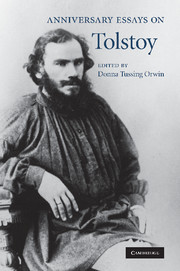Book contents
- Frontmatter
- Contents
- Acknowledgments
- List of contributors
- Introduction
- 1 Tolstoy and music
- 2 Sublime vision and self-derision: the aesthetics of death in Tolstoy
- 3 Tolstoy's peaceable kingdom
- 4 Leo Tolstoy: pacifist, patriot, and molodets
- 5 Leo Tolstoy's correspondence with Nikolai Strakhov: the dialogue on faith
- 6 The worm of doubt: Prince Andrei's death and Russian spiritual awakening of the 1860s
- 7 Tolstoy's spirituality
- 8 Tracking the English novel in Anna Karenina: who wrote the English novel that Anna reads?
- 9 Violence and the role of drama in the late Tolstoy: The Realm of Darkness
- 10 What men quote by: Tolstoy, wise sayings, and moral tales
- 11 The “proletarian lord”: Leo Tolstoy's image during the Russian revolutionary period
- Bibliography
- Index
10 - What men quote by: Tolstoy, wise sayings, and moral tales
Published online by Cambridge University Press: 03 May 2010
- Frontmatter
- Contents
- Acknowledgments
- List of contributors
- Introduction
- 1 Tolstoy and music
- 2 Sublime vision and self-derision: the aesthetics of death in Tolstoy
- 3 Tolstoy's peaceable kingdom
- 4 Leo Tolstoy: pacifist, patriot, and molodets
- 5 Leo Tolstoy's correspondence with Nikolai Strakhov: the dialogue on faith
- 6 The worm of doubt: Prince Andrei's death and Russian spiritual awakening of the 1860s
- 7 Tolstoy's spirituality
- 8 Tracking the English novel in Anna Karenina: who wrote the English novel that Anna reads?
- 9 Violence and the role of drama in the late Tolstoy: The Realm of Darkness
- 10 What men quote by: Tolstoy, wise sayings, and moral tales
- 11 The “proletarian lord”: Leo Tolstoy's image during the Russian revolutionary period
- Bibliography
- Index
Summary
THE SHORTEST LITERARY WORKS
The author of War and Peace also mastered short forms, including moral tales and the shortest of all literary forms, the quotation.
Tolstoy loved quotations. By “quotations” I mean not any set of cited words, but the sort of memorable short saying that we find in Bartlett's Familiar Quotations and similar volumes. Although it is often assumed that Bartlett invented the anthology of quotations, it derives from a tradition extending back to the Renaissance (Erasmus' Adagia), medieval florilegia, ancient classics including Diogenes Laertius, and the biblical Book of Proverbs, which is itself a collection of collections of Middle Eastern proverbs.
To be a quotation in this sense, a set of words must be able to stand on its own as a complete, if brief, literary work. It must be quotable. We may therefore distinguish what I shall call a quotation – a short literary work – from an extract, in the sense of any set of cited words. Extracts, such as the sort of citations footnoted in scholarly articles, are neither offered nor taken as complete works capable of standing on their own.
Clearly, not all extracts are quotations. But neither are all quotations extracts. For one thing, although a quotation may have an extract as a source, it may and often does differ from its source if for no other reason than to stand on its own. Becoming a quotation is a change in status that often involves a change in text.
- Type
- Chapter
- Information
- Anniversary Essays on Tolstoy , pp. 199 - 218Publisher: Cambridge University PressPrint publication year: 2010



